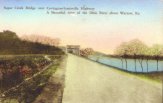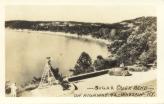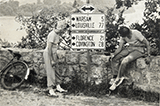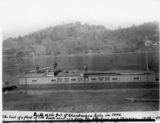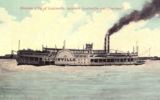
. . . or as it used to be known, Jackson's Landing
Sugar Creek Bridge, on US 42, above Warsaw
Thanks to Bill Davis for this one.
 |
 |
Sugar Creek Scenes, 1937 Flood
A pair of bicycle tourists, stop for a cigarette, and a real close look at the mileage sign.
![]()
This is the trading boat of Nathan Brown, whose Civil War adventures at Sugar Creek are below.
Unsure of the location of this particular picture.
| Absolutely you don't want to miss the account of Nathan Brown, who ran a store boat on the Ohio River. His adventures at Sugar Creek in the Civil War are transcribed here. More here. |

Excerpted from The Voice of the Frontier: John Bradford's Notes on Kentucky
December 27, 1789
| The tornado of the Spring of 1860 “in the vicinity of Sugar Creek and Warsaw, the storm was very violent, sinking coal boats, prostrating trees, and unroofing houses.” From Frankfort’s Tri-Weekly Yeoman, May 24, 1860 | |
| A little Sugar Creek area history is here. | Patrick Shay boards the Dumont, here. |
| “The Gallatin Democrat says: 'Gallatin County this time brings forward a man who we claim is the oldest mail carrier in the United States. His name is Walter Atha, and he is in his ninetieth year. He carries mail from Elliston to Sugar Creek, a distance of seven miles, three times a week. He is remarkably well preserved, and thinks nothing of walking two or three miles by way of exercise. He was born in Virginia and spent much of his early life in that region. He tells many interesting stories of his acquaintances with Gen. Washington and other notables of the early part of the century.' As Washington died the year the old mail carrier was born, the latter's stories about their acquaintances must be very curious indeed.” Courier-Journal, June 27, 1889 | |
The American Party meets at Sugar Creek
![]()
| This is the City of Louisville, a larger than average steamer. As Captain Ed Maurer once said, “When you had her hard down rattling down around Sugar Creek Bend, she was a lot of lumber.” |
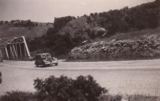 |
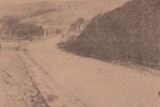 |
| An early view of Sugar Creek | Sugar Creek Bridge, October, 1937 |
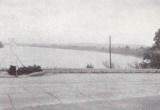 |
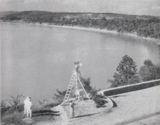 |
| The 1942 Kentucky Highway Department Report, offered this scene as an example of how counties can create attractive“roadside parks and overlooks.” |
Sugar Creek Overlook, 1949 |
1940 Ice at Sugar Creek
From a Facebook post by Linda Schilling Mitchell
City of Wheeling, tied up at Sugar Creek, 1902
 |
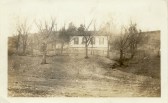 |
 |
 |
| Sugar Creek Church of Christ | |||
| Rev. Irv Stephenson's history of the church is here. | Where the old church was, here. | The dedication of the new church, here. (pdf) | The new Sugar Creek Church of Christ Dedicated December 4, 1949 |
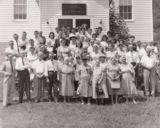 |
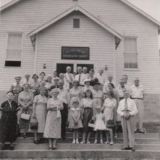 |
 |
 |
|
Rev. Irv Stephenson is fourth |
1957 |
1930's | 1946 | |
| These four pics are all Sugar Creek Church congregations. Some of the folks are identified here. | ||||
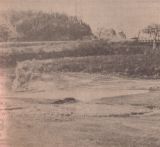 |
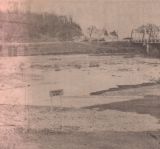 |
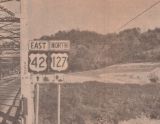 |
| Sugar Creek, before and after Markland Pool | Sugar Creek Boat Ramp, |
|
![]()
The John Dana, in the ice at Sugar Creek, December, 1892
| In 1918 there was a huge ice dam that formed at Sugar Creek. A Lawrenceburg paper asserted that “the Sugar Creek gorge passes into history as the most phenomenal one ever formed on the Ohio River.” It effectively dammed up the Ohio, creating high water all the way back to Cincinnati. Nothing scared the old time river men like ice, because when an ice dam breaks, and they always break, they create fast moving torrents not only of water, but of giant pieces of ice that will destroy a steamboat or anything else in their path. When the 1918 dam broke on January 30, 1918, the water in Cincinnati fell from 62 feet to 20 feet in 2 hours, destroying any number of steam boats. Imagine what was happening downstream. |
| “According to the daily specials in the Cincinnati dailies, the gorge at Sugar Creek, near Patriot, has caused the river to be thirty-five feet higher above the gorge than it is below it. This accounts largely for the high stage at Lawrenceburg.” The Lawrenceburg Press, February 7, 1918 |
Read about some of the ice gorge stories about the Sugar Creek and Boone County in 1918, here.
Earlier ice issues, from 1893, here.
![]()
